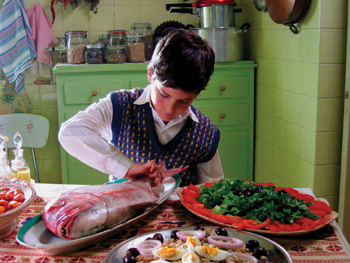![[Metroactive Movies]](/movies/gifs/movies468.gif)
[ Movies Index | Show Times | Silicon Valley | Metroactive Home | Archives ]
A man eats the bitter dolmas of exile in 'A Touch of Spice,' a Greek story that combines food-porn and pithy sayings
By Richard von Busack
WHY DID Constantinople get the works? The musical question posed by They Might Be Giants isn't directly solved by the Greek import A Touch of Spice. Clearly, the wrong answer is "It's nobody's business but the Turks'" when we see how Turkish nationalism is unleashed on a minority of Constantinople Greeks—a group forced into exile from the city they loved so much.
Tassos Boulmetis' memory film flashes back from the story of Fanis Iakovidis' present as a successful astronomer in modern Athens to his childhood in the Bosporus Greek community of Istanbul. His grandfather is the owner of a store so good that even the Turkish officials can't resist it.
Surrounded by sweet smells and savory flavors, young Fanis develops a gift for cooking, discouraged in that macho society. The love of his life, a little neighbor girl named Saime, is drawn by Fanis' culinary expertise.
When the Turkish politicians decide to expel Fanis and his family in 1964, it's a blow he can't get over for years. The exiles arriving in Athens are called "Turks" by the Greeks, even as they were called "Greeks" by the Turks.
Although it celebrates spices, A Touch of Spice seems like the typical freezer-fresh Ethnic Film 101 view of a community, with its colorful anecdotes, cute family squabbling and beauty shots of banquets. It's meant to be as much of a meal as a film, since it's divided into sections titled "The Preparation," "The Appetizers," "The Main Course" and "The Desserts" and "The Presentation."
The film takes different sides on the argument over the use of cumin vs. cinnamon in meatballs. In between the delicious-looking meals come the pithy proverbs: "Relationships without arguments are like weddings without music," "Sometimes it's better to use the wrong spice to get your point across."
The computer animation is an example of the wrong spice: a Constantinople re-created as it was in 1959, but looking as if it were supposed to be the days of the Arabian nights. The animation includes a muezzin in a minaret, dwarfed in pull-back so that we can see the city below (it looks as if it were backward-engineered from the scene of Saruman casting spells from the tower of Isengard in The Fellowship of the Ring).
As actors, neither Fanis (played by the young Markos Osee or the older Georges Corraface) makes a big impression. And the love story in the adult section seems as stodgy as those antique, death-before-divorce romances under the Hollywood production code.
Happy endings aren't what can be expected in a part of the world as wracked with conflict as Greece and Turkey. The exiling in 1964 was only one incident of the friction between these two countries. The saddest moment in the film is an anecdote about an old man who loved Constantinople so much he almost gave up his God for it. Living on the edge of Christendom, he was unable to have King Henry Quatre's ease of mind about changing his religion as long as it meant dwelling in a great city: "Paris is worth a mass."
If this film has any deeper significance outside Greece, it's as a reminder that a city wounds itself when it tries to cleanse itself of ethnics—whether it expels them deliberately, as Istanbul did, or whether it allows them to be pushed to the periphery (as happened in Paris).
[ Silicon Valley | Metroactive Home | Archives ]
Copyright © 2005 Metro Publishing Inc. Metroactive is affiliated with the Boulevards Network.
For more information about the San Jose/Silicon Valley area, visit sanjose.com.
![]()

The Mister of Spices
A Touch of Spice (Unrated), directed and written by Tassos Boulmetis, photographed by Takis Zervoulakos and starring Georges Corraface.
Send a letter to the editor about this story to letters@metronews.com.
Web extra to the November 30-December 6, 2005 issue of Metro, Silicon Valley's Weekly Newspaper.